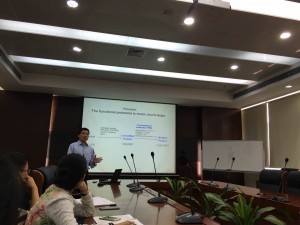 On November 8,2016, with the invitation of Prof. Zigang Li, teachers and students of our school actively participated in the academic discussion and exchanged ideas.
On November 8,2016, with the invitation of Prof. Zigang Li, teachers and students of our school actively participated in the academic discussion and exchanged ideas.
Protein-ligand interactions mediated by modular domains, which often play important roles in regulating cellular functions, are generally of moderate affinities. We examined the Src homology 2 (SH2) domain, a modular domain that recognizes phosphorylated tyrosine (pTyr) residues, to investigate how the binding affinity of a modular domain for its ligand influences the structure and cellular function of the protein. We used the phage display method to perform directed evolution of the pTyr-binding residues in the SH2 domain of the tyrosine kinase Fyn and identified three amino acid substitutions that critically affected binding. We generated three SH2 domain triple-point mutants that were “superbinders” with much higher affinities for pTyr-containing peptides than the natural domain. Crystallographic analysis of one of these superbinders revealed that the superbinder SH2 domain recognized the pTyr moiety in a bipartite binding mode: A hydrophobic surface encompassed the phenyl ring, and a positively charged site engaged the phosphate. When expressed in mammalian cells, the superbinder SH2 domains blocked epidermal growth factor receptor signaling and inhibited anchorage-independent cell proliferation, suggesting that pTyr superbinders might be explored for therapeutic applications and useful as biological research tools. When etopically expressed in stem cells, the superbinder-containing protein Grb2 promoted precocious differentiation of mouse embryonic stem cells. Although the SH2 domain fold can support much higher affinity for its ligand than is observed in nature, our results suggest that natural SH2 domains are not optimized for ligand binding but for function, which are likely properties important for their function in signaling and regulatory processes.
Profile for the speaker:
Dr. Shawn Li received his B.S. degree from Peking University in 1985, and Ph.D. degree from University of Toronto in 1995. After five years of postdoctoral research in Samuel Lunenfeld Research Institute, Mt. Sinai Hospital, Dr. Li started his own independent career in the Department of Biochemistry at the Western University in 2000. He is now Canada Research Chair in Proteomics and Functional Genomics.His research interests lie at elucidating the molecular and epigenetic basis of cancer with the ultimate goal of developing protein- and peptide-based diagnostic or therapeutic agents for cancer. He has received numerous research and teaching awards, among which the latest ones include the Worldiscoveries Annual Vanguard Awards (2016).